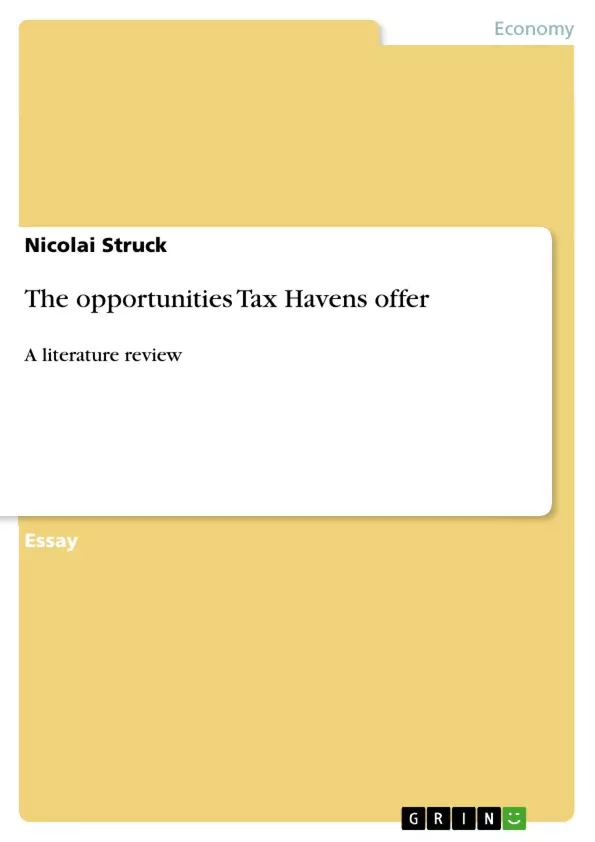This essay reviews the academic literature on the potential positive effects of tax havens on non-haven industrialized countries. It starts with briefly defining tax havens in section 2. In section 3, the essay outlines the traditional "negative" view on tax havens and the prevalence of this view in empirical literature. Section 4 contrasts the preceding section and investigates the emerging "positive" view on tax havens. The conclusion answers the research questions and summarises the most important findings.
The public image of tax havens is "traditionally" negative. Scandals in the past (e.g. Liechtenstein Affaire, Panama Papers) elucidated the role a tax haven may play for a variety of high net worth individuals and/or political figures as a secrecy-jurisdiction to facilitate illegal activities, such as the evasion of taxes and/or safe-keeping/hiding of illicit earnings. Non-governmental organizations (such as the Tax Justice Network and the Global Finance Integrity) denounced the spread of tax havens and published listings of havens they deem potentially harmful to the global economy. Academic literature also highlights how tax havens exacerbate harmful tax competition and allow multinational corporations to avoid taxes in developed and developing countries alike through tax planning, thus being of "parasitic" nature for the global economy.
Inhaltsverzeichnis (Table of Contents)
- Introduction
- Problem Statement
- Objective of the Essay
- Organization of the Research
- Definition of Tax Haven
- The Traditionally Negative View on Tax Havens
- Tax Planning
- Can Tax Havens be Beneficial?
- Keen (2001)
- Hong and Smart (2010)
- Chu, Lai and Cheng (2013)
- Desai et al. (2006)
- Additional Literature
- Conclusion
- References
Zielsetzung und Themenschwerpunkte (Objectives and Key Themes)
This essay critically reviews the academic literature on the potential benefits of tax havens, particularly focusing on their impact on non-haven industrialized countries. The paper investigates whether the traditionally perceived negative effects of tax havens, such as tax evasion and harmful competition, are exaggerated and explores whether tax havens can offer positive economic outcomes for developed economies.
- The impact of tax havens on the tax base of developed countries.
- The potential for tax havens to mitigate tax competition and raise social welfare.
- The role of tax planning in corporate strategies involving tax havens.
- The evolution of the academic discourse surrounding tax havens, encompassing both negative and positive perspectives.
- The analysis of empirical studies that explore the economic effects of tax havens.
Zusammenfassung der Kapitel (Chapter Summaries)
- Introduction: The essay begins by introducing the public perception of tax havens as predominantly negative, citing examples like the Liechtenstein Affaire and Panama Papers. It then outlines the objective of the research, which is to investigate the potential benefits of tax havens for non-haven economies. The essay also introduces the research questions, which focus on the potential exaggeration of negative effects and the possibility of positive impacts.
- Definition of Tax Haven: This section delves into the definition of tax havens, referencing the concept of optimal taxation. It examines the role of location-specific rents and explores how small open economies can attract capital by offering low tax environments. The section also refers to Hines' research on the growth rates of tax havens between 1982-1999. It further explores Desai et al.'s (2006) summary of the common characteristics of tax havens, emphasizing their low tax rates, advanced communication facilities, and secrecy legislation. Finally, the section introduces the Harmful Tax Practices Initiatives (OECD, 1998) and its criteria for identifying tax havens.
- The Traditionally Negative View on Tax Havens: This section discusses the traditional negative perception of tax havens, highlighting their role in tax evasion, money laundering, and harmful tax competition. It emphasizes the prevalence of this view in empirical literature and its focus on the detrimental impact of tax havens on the global economy.
Schlüsselwörter (Keywords)
Tax havens, tax planning, corporate taxation, offshore wealth, tax competition, economic development, globalization, multinational corporations, OECD, harmful tax practices, empirical research, social welfare.
Frequently Asked Questions
What is the definition of a tax haven?
A tax haven is a jurisdiction that offers foreign individuals and businesses little or no tax liability in a politically and economically stable environment. They often feature high levels of financial secrecy and advanced communication facilities.
Why are tax havens traditionally viewed negatively?
They are often associated with tax evasion, money laundering, and "parasitic" tax competition that drains the tax bases of developed countries, as highlighted by scandals like the Panama Papers.
Can tax havens actually be beneficial to the global economy?
Some academic literature suggests they can mitigate harmful tax competition, raise social welfare in certain contexts, and facilitate foreign direct investment (FDI) by providing efficient tax planning environments for multinational corporations.
How do multinational corporations use tax havens?
Multinationals use havens for tax planning to reduce their global tax burden, often through profit shifting or holding offshore wealth, which helps them remain competitive in international markets.
What are the OECD's criteria for identifying a tax haven?
The OECD's 1998 initiative lists criteria such as no or nominal taxes, lack of effective exchange of information, lack of transparency, and the absence of a requirement that activities be substantial.
What is "Harmful Tax Competition"?
It refers to the practice where countries lower their tax rates to attract mobile capital from other countries, potentially leading to a "race to the bottom" that undermines the funding of public services worldwide.
- Quote paper
- Nicolai Struck (Author), 2020, The opportunities Tax Havens offer, Munich, GRIN Verlag, https://www.grin.com/document/913960



